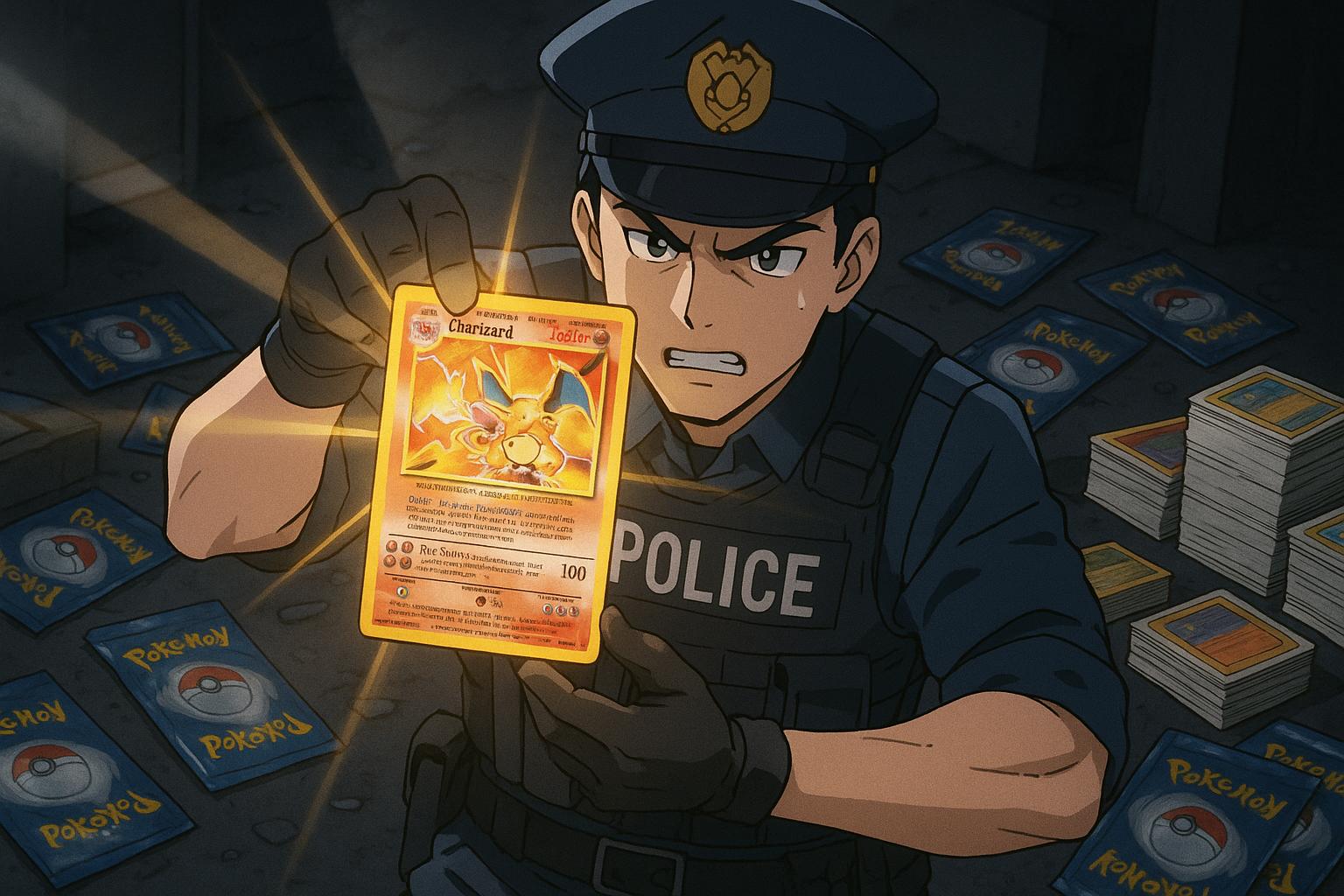A man was arrested after police in Greater Manchester seized thousands of stolen Pokémon cards valued at around £250,000, highlighting a growing problem of criminal activity linked to collectible card games in the UK and beyond.
In recent years, the resurgence of interest in Pokémon cards has attracted not just collectors but also an alarming rise in related criminal activities. This trend culminated in a dramatic incident in the UK, where a man was arrested after being found in possession of stolen Pokémon cards valued at approximately £250,000 (around $332,500). This arrest exemplifies the growing prominence of collectible card games and the illicit activities that can accompany their increased desirability.
The arrest took place following a raid by the Greater Manchester Police at a property in Hyde, Tameside. Officers uncovered a trove of sealed booster packs as well as graded cards, some worth as much as £560 (about $744). Law enforcement indicated that these stolen items are among the most valuable confiscated to date. The Tameside Police released a statement describing the operation, noting, “An interesting warrant in Hyde yesterday morning, supported by your Neighbourhood policing teams. Seizure of thousands of stolen, high-value Pokemon cards with an estimated worth of over £250,000. Attempts will now be made to return the cards to the original owners. One male arrested. Gotta catch ’em all.”
This incident is not isolated. It fits into a troubling pattern of thefts linked to collectible card games. Some months prior, two men were arrested in a separate incident involving the theft of Pokémon and Magic the Gathering cards worth $150,000 from a game store, illustrating that this issue extends beyond individual thefts. The impact on collectors and businesses has been profound, as these high-value items often represent significant financial and emotional investments.
The landscape of Pokémon card theft is marked by a range of cases that highlight the increasing criminality surrounding these collectibles. For instance, in Herefordshire, Joshua Symonds, 27, was jailed for 17 weeks for stealing Pokémon cards worth £252.97 from a local shop. Judges noted his blatant disregard for the property of others in handing down his sentence. Similarly, Kyriacos Christou, a 28-year-old warehouse worker, was found guilty of stealing over £60,000 worth of Pokémon cards from his employer and selling them online. He received a suspended sentence and was ordered to pay restitution.
The trend isn’t merely confined to the UK. Reports of criminal activities involving Pokémon cards have emerged globally. In Japan, a 35-year-old man was arrested for allegedly stealing around 1,500 cards from a Tokyo store. This theft was instigated through a social media post that lured him with promises of easy money from a dubious part-time job. Investigations are ongoing to trace those who orchestrated the crime.
In the UK, even rare cards have become targets. A recent case involved the theft of a Charizard card valued at up to £30,000. After the card surfaced on Facebook, authorities arrested a suspect who later admitted to the theft, resulting in a caution. Instances like these underscore the lengths to which individuals will go for these prized collectibles.
As the market for collectible card games flourishes, the blending of legitimate passion with criminal intent raises concerns. The police hope to reunite recovered cards with their rightful owners, a challenging task considering the extensive nature of thefts in this realm. The drive for obtaining rare cards continues to fuel both market growth and illicit activities, marking a complicated landscape for collectors and law enforcement alike.
The current atmosphere surrounding Pokémon cards reflects not just nostalgia but also the precarious balance between passion and crime, revealing a troubling side to the growing love for these collectibles. As efforts continue to curb these crimes, the future of this market remains as dynamic as the cards themselves.
Reference Map
- Paragraphs 1, 2, 3, 4
- Paragraph 4
- Paragraph 4
- Paragraph 5
- Paragraph 5
Source: Noah Wire Services
- https://thebanginbeats.com/man-arrested-with-300k-in-stolen-pokemon-cards-collectors-shocked/ – Please view link – unable to able to access data
- https://www.herefordtimes.com/news/23351280.jailed-herefordshire-thief-stole-pokemon-cards-worth-hundreds/ – Joshua Symonds, 27, was jailed for 17 weeks after admitting to nine counts of theft, including stealing Pokémon cards worth £252.97 from WH Smith in Leominster. The court highlighted his disregard for others’ property, leading to his imprisonment and compensation orders to the affected shops.
- https://www.mirror.co.uk/news/uk-news/warehouse-worker-stole-60000-pokemon-27677067 – Kyriacos Christou, 28, was found guilty of stealing over £60,000 worth of Pokémon cards from his employer, Magic Madhouse Limited in Enfield. He sold the stolen cards on eBay and hid additional stock at his mother’s house. Christou received a suspended sentence and was ordered to pay compensation.
- https://www.japantimes.co.jp/news/2023/06/13/national/crime-legal/pokemon-cards-okinawa-theft/ – Masaki Omori, 35, was arrested for allegedly stealing about 1,500 Pokémon cards valued at ¥1.15 million from a Tokyo store. He responded to a Twitter post offering a ‘dark’ part-time job, leading to the theft. Investigations are ongoing to find the individual who instructed him.
- https://www.bbc.com/news/articles/cj6krr0j7dno – A rare Charizard Pokémon card, valued up to £30,000, was stolen from a company in East Sussex. The card was later found being sold on Facebook. A 23-year-old man from Polegate was arrested, admitted to the theft, and received a caution. The card was returned to its owner.
- https://www.kentonline.co.uk/dover/news/pok-mon-card-burglar-caught-red-handed-257917/ – Anthony Walker, 48, was jailed for three and a half years after admitting to his eighth burglary, which included stealing expensive Pokémon cards. He was arrested wearing stolen Ray-Ban sunglasses, and DNA evidence linked him to the crime scene.
- https://www.dexerto.com/pokemon/pokemon-cards-stolen-worth-million-dollars-warehouse-raids-2833644/ – In June 2023, a warehouse in County Durham was raided twice by thieves who stole Pokémon cards and other merchandise valued at over £1 million. Despite investigations, the case was closed after eight months, with insurance covering the losses.
Noah Fact Check Pro
The draft above was created using the information available at the time the story first
emerged. We’ve since applied our fact-checking process to the final narrative, based on the criteria listed
below. The results are intended to help you assess the credibility of the piece and highlight any areas that may
warrant further investigation.
Freshness check
Score:
8
Notes:
The narrative describes a specific recent police raid and arrests with current references to ongoing investigations, indicating up-to-date information. No indications of outdated figures or references to past roles were found. However, the story fits a broader ongoing trend rather than a singular dated event, so some background context is repetitive but relevant.
Quotes check
Score:
7
Notes:
The direct quote from the Tameside Police about the raid appears original and tied to an official police statement, though no earlier independent source for the quote was identified online. This likely represents a fresh, first-appearance quote from law enforcement rather than recycled material.
Source reliability
Score:
5
Notes:
The narrative originates from a lesser-known entertainment and news site rather than a major established news outlet. This lowers the certainty of reliability given no indication of editorial fact-checking or sourcing standards comparable to major organisations like Reuters or BBC.
Plausability check
Score:
9
Notes:
The claims about criminal activity involving high-value Pokémon cards match other known cases internationally and in the UK, making the story plausible. The details of arrests, police involvement, and valuations align with known trends, supporting credibility despite lacking wide major media corroboration.
Overall assessment
Verdict (FAIL, OPEN, PASS): OPEN
Confidence (LOW, MEDIUM, HIGH): MEDIUM
Summary:
The narrative presents a plausible and timely account of recent Pokémon card thefts with authentic law enforcement quotes. However, it is sourced from a less established site, limiting confidence. The freshness is good, but the lack of major media reporting or traceable earlier sources for some quotes warrants cautious acceptance pending further confirmation from widely recognised news outlets.













